 The Biotechnology Industry Organization (BIO) released a new study by Meir Pugatch, David Torstensson and Rachel Chu at its annual conference that explores the link between intellectual property and Foreign Direct Investment (FDI). Taking Stock: How Global Biotechnology Benefits from Intellectual Property Rights argues that stronger intellectual property protection has helped attract investment into middle income countries since 1980. It does not describe other economic changes that have occurred in emerging markets in the past three decades that could influence foreign investment.
The Biotechnology Industry Organization (BIO) released a new study by Meir Pugatch, David Torstensson and Rachel Chu at its annual conference that explores the link between intellectual property and Foreign Direct Investment (FDI). Taking Stock: How Global Biotechnology Benefits from Intellectual Property Rights argues that stronger intellectual property protection has helped attract investment into middle income countries since 1980. It does not describe other economic changes that have occurred in emerging markets in the past three decades that could influence foreign investment.
The study does not address the effect of TRIPS-Plus intellectual Property provisions such as data exclusivity, linkage, or the patenting second uses of known subject matter – despite BIO’s lobbying for these provisions in the Trans Pacific Partnership and through the Special 301 process.
The empirical section of the study uses the Ginarte-Park Index as a measurement of the strength of patent protection. This index is determined by five factors: the extent of coverage; membership in international patent agreements; duration of protection (up to 20 years); enforcement provisions; and restrictions on patent rights. For a fuller description of the Ginarte-Park Index, see International Patent Protection: 1960–2005 by Walter Park (2008) and Determinants of patent rights: A Cross-National Study by Juan Ginarte and Walter Park (1997).
The strength of IP as measured by the Ginarte-Park was reported alongside UNCTAD data on foreign direct investment in ten countries – Argentina, Brazil, China, India, Israel, Japan, Korea, Russia, Singapore and Taiwan. Both IP and FDI increased.
Pugatch, Torstensson, and Chu also includes short narratives on emerging markets that have increased IPR and seen an increase in biotech investment. China, Brazil and India are included as success stories – countries where advanced R&D financed by international investment has flourished as intellectual property protection has risen to the level required by TRIPS. Once again, there is no mention of the TRIPS-plus provisions sought by the industry through trade negotiations or bilateral trade pressures.




